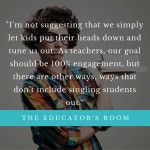Testing is upon us or was upon us a couple of weeks ago. Scores are coming back and no matter what, there are consequences to those scores. I have never made it a secret that I completely disagree with the way our system uses standardized testing. Standardized testing only measures where a student is now, but not how far they have come. Many districts use the final score for teacher evaluations, student “tracking” (even though technically, it is illegal, it still happens), and school performance scores. Tests are biased, kept under lock and key, and graded in minutes by people who many or many not have a background in the subject they are grading or even a background in education. These tests simply show where a student is currently, and many times, it doesn’t accurately show that.
[fusion_builder_container hundred_percent=”yes” overflow=”visible”][fusion_builder_row][fusion_builder_column type=”1_1″ background_position=”left top” background_color=”” border_size=”” border_color=”” border_style=”solid” spacing=”yes” background_image=”” background_repeat=”no-repeat” padding=”” margin_top=”0px” margin_bottom=”0px” class=”” id=”” animation_type=”” animation_speed=”0.3″ animation_direction=”left” hide_on_mobile=”no” center_content=”no” min_height=”none”][bctt tweet=”These tests simply show where a student is currently, and many times, it doesn’t accurately show that.” username=”EducatorsRoom”]
Standardized testing is causing an environment in our classrooms that is devastating to our society. The pressure to produce test scores and high results is causing horrible situations in our school system.
Here are some examples:
1. Student A has an A in English II. She works extremely hard, studies, and produces wonderful work. The day of the test, she is confident and excited. She takes the longest, writing a rough draft, and double-checking answers. The score comes back as a needs improvement. She is devastated. She is broken because her entire self-worth was tied to a test score. All the work she did in class and how far she has come, does not mean a thing. She seconded guessed herself on a test, and now she is so broken hearted, she shuts down.
2. Student B has a 29 F in English III. He does absolutely nothing in class. The teacher has called home, only to find there are no working numbers. He scores a proficient score on his standardized test. What does this truly measure? It could be the child is just brilliant and is bored during the English class. It could mean he cheated. It could even mean he was listening, just not turning one assignment in. But a teacher cannot grade air. Doesn’t work ethic count for anything? Is education really just about the ability to pass a test? Or is about solving difficult problems, working together to find a solution, coming up with new ideas that can improve society, even simply learning to organize your life? A test does not measure that. As my kids say, “in real life,” do we just take a test every day?
[bctt tweet=”Doesn’t work ethic count for anything? Is education really just about the ability to pass a test?” username=EducatorsRoom””]
3. Student C claims that all he has to do is pass the standardized test, and he will pass the course. Last year, he did the same thing but passed the test with flying colors, so he was passed on to the next grade, even though he did absolutely nothing. So he does nothing all year long because “he got this.” Well, it turns out he didn’t. He doesn’t understand why he did not pass the test. He did not see the correlation between working in the class and studying with passing a test. This one was too hard, so he claims that the teacher did not teach him or prepare him. He declares he is dropping out because now he will have to retake the class.
4. Teacher A had honors students, and Teacher B had remedial students. Teacher A’s students score perfectly on the test. Teacher B students scored well, but not as high. Who worked harder? But who gets the most recognition? It breeds an atmosphere of discontent, jealousy, and resentment.
5. Teacher C is waiting for her scores to come in. She is nervous beyond belief because there is so much tied to these scores. The school is counting on her to produce points for them. Half of her evaluation is tied to how well the students performed on the test, and she knows some of her students will not graduate if they do not pass this test. Test scores come in. For the most part great, many of the students passed but did not score high enough for the school to get points or for them to count for her evaluation. But she is excited because her kids passed! But then one of them walks up and asks, “Miss, we passed, but what will your grade as a teacher be? I’m sorry if we let you down.”
These situations and much more are happening across our country. These tests, while they are necessary, are causing damage the way they are being used. Standardized tests are used to determine college readiness and college credit. They are also used to measure career readiness. Teachers, doctors, nurses, and lawyers all take a standardized test to find if they are prepared for their career choice. The difference is those tests are designed for adults. Is it necessary for a second grader to take a standardized test to determine if they are ready for third grade? What about the teacher who went to school, received at least a bachelor’s in elementary education, passed her standardized test, and receives additional training every year, maybe just maybe she could tell if the seven-year-old is ready? Where is the trust?
These tests give teachers and administration data indicating where our students are weak and where re-teaching needs to happen, and when it is time to try a new method to help enhance student understanding. Standardized tests do serve a purpose, but the importance placed on them is destroying the school system. Every day we see media telling us not to place value on a number whether it be age, weight, or income, yet we label our kids with a score and how many points they can give us, or a teacher’s worth based on how much she can do for a school score. Our kids are not numbers or point values, and our teachers are ALL important. And until we realize the school system is not just a place to take tests, society will not improve.
Our schools are here to educate our students teaching values, kindness, cooperation, and so much more. Unless we want to produce a generation of kids that just can “beat a test,” we have to stop putting so much value on a test that a cooperation produced to make money, that will be changed in a few years, and that does not measure everything a complete education gives.
[bctt tweet=”Every day we see media telling us not to place value on a number whether it be age, weight, or income, yet we label our kids with a score and how many points they can give us, or a teacher’s worth based on how much she can do for a school score.” username=EducatorsRoom””]
 [/fusion_builder_column][/fusion_builder_row][/fusion_builder_container]
[/fusion_builder_column][/fusion_builder_row][/fusion_builder_container]






This is wonderfully detailed and insightful. 🙂 I have watched MANY kids take soooo many, many tests (our district has become so test-fanatic that it is now overwhelming). I would thus move the argument to this platform: ARE tests really necessary? Is the punitive standardized testing of diverse student populations necessary and helpful or simply humiliating and damaging? We used to take two half-day Iowa tests and that was it for the year. Then we somehow handed all of our Title I money over to the school “reformers” and now tests rule as king in our lowest-income schools.